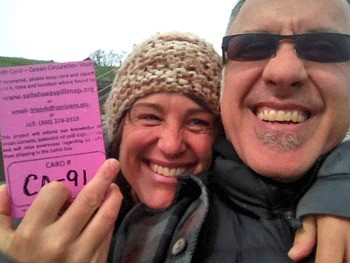Journal staff report
Conservation groups from Washington and British Columbia commemorated the 25th anniversary of the Exxon Valdez oil spill by launching 650 ‘drift cards’ along Salish Sea oil tanker routes.
The event, organized by Friends of the San Juans in Washington state and by Raincoast Conservation Foundation and Georgia Strait Alliance in Canada, is part of a study mapping the path that an oil spill might take in the Salish Sea.
The cards were dropped at two locations: off Turn Point, Stuart Island, where Haro Strait intersects with Boundary Pass, and near Bird Rocks in Rosario Strait. They carry a simple message: This Could Be Oil.
This research responds to a sharp increase in fossil fuel export projects proposed in British Columbia and Washington state. The proposed Gateway Pacific coal terminal at Cherry Point north of Bellingham and Kinder Morgan’s increase in tar-sands shipping from Vancouver, and other projects, would add an additional 2,620 ship transits per year to the waters of the Salish Sea, making the region one of North America’s busiest fossil fuel shipping corridors.
“The increased risk of a major oil spill in the Salish Sea is real,” said Stephanie Buffum, executive director of Friends of the San Juans. “Anyone with a cultural, environmental or economic interest in our region should get engaged with Coast Guard rulemaking; familiarize themselves with effects of cargo traveling through our waters; and ask decision makers to ensure diluted bitumen (oil sand) is classified as a petroleum product that is taxed to fund oil spill clean-up efforts.”
The groups ask that the public get involved in the research project by staying on the lookout for the 4-inch by 6-inch pink drift cards on local shorelines.
Found cards can be reported online at the interactive website: www.SalishSeaSpillMap.org. You can also call Friends of the San Juans at 360-378-2319, or email friends@sanjuans.org. Provide the date, time, contact information and an “as accurate as possible” location description of your find. Send a picture of yourself with the card if you want.
As of Friday, March 28, four days into the study, 45 cards have been reported from Lummi Island, Wash., to Victoria, British Columbia. Cards from Monday’s drop off at Bird Rocks in Rosario Strait have been found on southeast Lopez and southeast Orcas islands.
“The results from our drift card drop last fall show that cards move quickly, have a wide distribution of recovery locations, and that there would likely be major cross-border impacts from an oil spill along the shipping routes,” said Andy Rosenberger, Raincoast Conservation Foundation biologist. “These current drops will give us more information about seasonal differences in trajectories and areas likely to be impacted, including information from new locations.
The 1989 Exxon Valdez Prince William Sound spill of crude oil coated 1,300 miles of coastline with ecological and economic devastation still being felt today. San Juan County, with 400 plus miles of shoreline, is at the heart of the Salish Sea and at the center of what tanker captains call “the round-a-bout.”
The study will help identify areas most at risk of oiling in the event of a spill, and it raises awareness of the increase in fossil fuel shipping, the proposed terminal projects, and the policy issues being discussed.
“We share one coastline, one ocean and one climate, and that’s why Americans and Canadians are uniting to protect the Salish Sea from the threats posed by new fossil fuel export projects,” said Christianne Wilhelmson, executive director of Georgia Strait Alliance.
For more information go to www.sanjuans.org; www.raincoast.org; www.georgiastrait.org.



